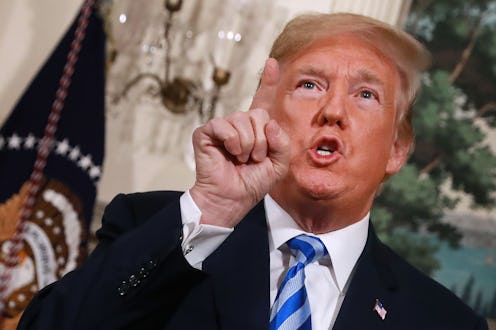News
6 Iran Deal Pros & Cons, Because Trump's Decision To Ditch It Is A BFD

President Trump announced Tuesday that he will withdraw the U.S. from the Iran nuclear deal, the landmark 2015 agreement in which Iran agreed to freeze much of its nuclear program in exchange for relief from longstanding economic sanctions. Although it's too soon to say what this means for the future of of Iran's nuclear capabilities or its relationship with the West, many say that the pros and cons of the Iran deal suggest that Trump's decision could be disastrous.
"The Iran deal is defective at its core," Trump announced in a White House address Tuesday. "If we do nothing, we know exactly what will happen. In just a short period of time, the world's leading state sponsor of terror will be on the cusp of acquiring the world's most dangerous weapon."
The details of the Iran deal are very complex, but the gist of it is simple: Iran agreed to limit several of its most controversial nuclear activities, mostly related to uranium enrichment and the production of plutonium, that critics have long sees as a path to developing nuclear weapons. In exchange, a coalition of five countries — including not only the U.S. but also the United Kingdom, France, Russia and China — agreed to lift economic sanctions that they had previously imposed on Iran.
The deal was controversial in 2015, and it's controversial now. Here are the arguments for and against the Iran nuclear agreement.
Pro-Deal: Iran Is Complying
As part of the deal, Iran agreed to regular inspections of its nuclear facilities by the International Atomic Energy Agency (IAEA), a United Nations watchdog, to ensure that it isn't developing it nuclear program beyond the limits imposed by the agreement.
As of June 2017, both the IAEA and Trump's own State Department, as well as the chairman the Joint Chief of Staff, have concluded that Iran is indeed complying with the terms of the deal, which involved destroying almost 14,000 nuclear centrifuges and filling its heavy water nuclear reactor with concrete.
(Iran did, on two occasions, produce slightly more heavy water than the deal allows; Daryl Kimball of the the Arms Control Association told PolitiFact that this amounted to a "minor infraction" with no practical effect on Iran's abilities to develop a nuclear weapon).
Anti-Deal: Iran Fleeced The U.S. For Billions
Embodying many opponents of the deal, Sen. Orrin Hatch has criticized the agreement on grounds that the U.S. gave "massive concessions to the Iranian regime for so little in return," and argued that the the lifting of sanctions will "allow an influx of international businesses into Iran, bringing about a stronger economy and greater revenue for the Tehran regime."
But as previously noted, weapons inspectors have said that the Iranian government has indeed significantly curbed its nuclear program, as required by the deal. And while it's true that the deal has modestly boosted Iran's economy and allowed for more international investments, not everyone would argue that these are bad developments.
Pro-Deal: It Discourages Nuclear Proliferation
Although some components of the Iran deal expire in 10 years, its agreement to never develop a nuclear weapon is permanent. The IAEA has concluded that the country's abilities to develop a nuclear weapon have been drastically diminished since the deal.
All of this serves the broader goal of discouraging a nuclear arms race in the Middle East. Shredding the deal, however, will almost certainly make it easier for Iran to develop a weapon, according to several experts — and Saudi Arabia has said that it will attempt to build its own nuclear bomb if Iran succeeds in doing so.
Anti-Deal: Iran Has Been Trying To Develop Nukes Since 2003
One of the fiercest critics of the deal is Israeli Prime Minister Benjamin Netanyahu. In April, Netanyahu presented documents that, he claimed, proved that Iran had a secret nuclear weapons program before 2003, and had lied to the United Nations about it. Trump cited Netanyahu's presentation days later as proof that he was "100 percent right" about the deal being bad.
This has never been in dispute, however, and it's not an argument against the deal. Richard Nephew, a former State Department official who helped negotiate the deal, told the Washington Post that Iran's history of seeking to develop nuclear weapons is "is why we negotiated the [deal]" in the first place, while Kimball says that this history "makes it all the more essential that the [deal] remains in place."
Pro-Deal: It Makes A Ground War Less Likely
One major benefit of the Iran deal is that it brought the U.S. and Iran slightly closer together after decades of open hostility and distrust. Many opponents of the deal actively want the U.S. to bomb Iran, and former Undersecretary of State for Political Affairs Wendy Sherman has warned that nixing the deal increases the likelihood of a military conflict between the U.S. and Iran.
Anti-Deal: A Major U.S. Ally Opposes It
Finally, many opponents argue that the U.S. shouldn't support a deal that's so strongly opposed by Israel, one of America's strongest allies. But while Netanyahu's stance on the agreement is clear, several current and former high-ranking Israeli officials support the deal. Moreover, though the U.S. and Israel are allies, their interests do not always align with one another, as evidenced by Israel's history of spying on American officials.
All of these arguments notwithstanding, the deal itself may survive America's withdrawal, as Iranian President Hassan Rouhani has said that Iran may stay in the agreement with the remaining signatories even after the U.S. pulls out. This and other uncertainties make it just about impossible to predict what the U.S.'s withdrawal will truly mean for the future of nuclear proliferation in the Middle East.